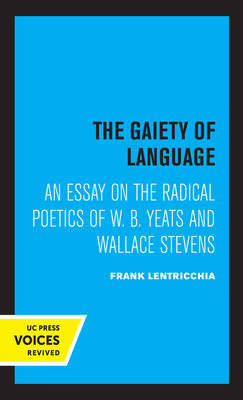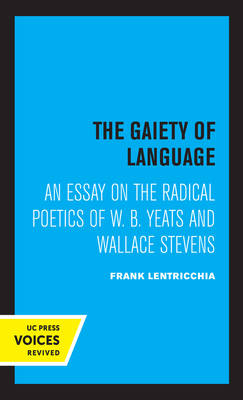
- Retrait gratuit dans votre magasin Club
- 7.000.000 titres dans notre catalogue
- Payer en toute sécurité
- Toujours un magasin près de chez vous
- Retrait gratuit dans votre magasin Club
- 7.000.0000 titres dans notre catalogue
- Payer en toute sécurité
- Toujours un magasin près de chez vous
The Gaiety of Language
An Essay on the Radical Poetics of W. B. Yeats and Wallace Stevens Volume 19
Frank Lentricchia
67,95 €
+ 135 points
Format
Description
This study explores the radical poetics of William Butler Yeats and Wallace Stevens, focusing on their contributions to modern literary theory and the unique role of imagination in their works. By tracing their poetic theories within the broader context of post-Romantic criticism, the essay critiques both the romantic idealism of the 19th century and the contextual theories of modern criticism. Yeats and Stevens challenge the notion of poetry as a direct avenue to transcendental truth, redefining the role of the imagination as an artistic force that operates within its own linguistic medium, unburdened by metaphysical or empirical agendas. Their poetics, often interpreted through contrasting lenses such as romantic organicism or the "visionary" archetypes championed by scholars like Northrop Frye, instead offer a framework where poems are self-contained entities. These works articulate the tension between the impoverished modern imagination and its capacity to find freedom and meaning within the act of creation itself. Through close readings of Yeats's and Stevens's prose and poetry, this essay argues that their works embody a "poetics of will," wherein the imagination, though constrained by the limitations of a disenchanted modern world, still achieves a vital cultural role. Unlike their predecessors, who viewed poetry as a conduit to metaphysical revelation, Yeats and Stevens position the poem as an autonomous artifact that captures fleeting moments of freedom and beauty. For the poet, the creative act becomes an assertion of control over the chaos of inner and outer realities, while for the reader, the well-wrought poem offers a brief but profound engagement with the artist's vision. In this way, Yeats and Stevens redefine the purpose of poetry, suggesting its essential contribution to human happiness and cultural resilience in an age marked by existential and aesthetic challenges. This title is part of UC Press's Voices Revived program, which commemorates University of California Press's mission to seek out and cultivate the brightest minds and give them voice, reach, and impact. Drawing on a backlist dating to 1893, Voices Revived makes high-quality, peer-reviewed scholarship accessible once again using print-on-demand technology. This title was originally published in 1968.
Spécifications
Parties prenantes
- Auteur(s) :
- Editeur:
Contenu
- Nombre de pages :
- 225
- Langue:
- Anglais
- Collection :
Caractéristiques
- EAN:
- 9780520315624
- Date de parution :
- 25-06-21
- Format:
- Livre broché
- Format numérique:
- Trade paperback (VS)
- Dimensions :
- 140 mm x 216 mm
- Poids :
- 290 g

Les avis
Nous publions uniquement les avis qui respectent les conditions requises. Consultez nos conditions pour les avis.






